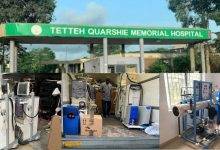
Dialysis, kidney transplant, or your life ends in the next five years,” said the Doctor. That was the dilemma that Ms Abigail Ashley found herself in when she was diagnosed with chronic kidney disease (CKD) end-stage sometime in August 2007.
She was terrified because it was a medical condition that usually tested one’s faith and finances. She could have managed the faith factor, but with the demise of her father, leaving the family economically drained, there was little or no hope for the financial obligation that beckoned.
That night, fear joined faith and finances in the never-ending train of thought. Every night, insomnia characterised her nights for fear of not crossing over to the next morning but she held on to her faith and never ceased praying.
Today – 15 years on– Ms Ashley has conquered her deadline and is the host of the “My Health, My Life,” programme on United Television (UTV), where she serves as a health line for her viewers.
WHAT ISCKD?
According to health experts CKD, also known as kidney failure is a condition in which kidneys are gradually damaged over a period of time and cannot filter blood as well as they should. Because of this, excess fluid and waste from blood remain in the body and may cause other health problems, such as heart disease and stroke.
They say that CKD may be caused by diabetes and high blood pressure with risk factors including a family history of the disease. Other causes of CKD include kidney stones, HIV and prostate diseases.
There are about five stages of CKD. Research has found that one would have lost almost about 90 per cent of his or her kidney function before they start having significant symptoms particularly from stage one to three. The late stage is where people start experiencing swollen legs, nausea, vomiting, difficult breathing, fatigue and abdominal pains.
For most people early diagnosis of CKD may be known through lab tests of urine and kidney function.
STATISTICS
According to the Centres for Disease Control and Prevention, more than one in seven people, that is 15 per cent of US adults or 37 million people, are estimated to have CKD. And as many as nine in 10 adults with CKD do not know they have CKD while about two in five adults with severe CKD do not know they have CKD.
Also, the National Centre for Biotechnology Information says CKD is a progressive condition that affects more than 10 per cent of general population worldwide, amounting to over 800 million individuals. The centre says that the condition is more prevalent in older individuals, women, racial minorities, and in people experiencing diabetes mellitus and hypertension.
Here in Ghana, the United States National Library of Medicine has found that CKD is common in hypertensive patients with a prevalence of 46.9 per cent.
Again, in an autopsy study, hypertension was an important cause of end-stage renal failure in Ghana, accounting for 33 out 78 (42%) cases.
HOW IT BEGAN
Before the diagnosis with CKD, Ms Ashley constantly suffered headaches that caused severe throbbing pain or a pulsing sensation, usually on one side of her head. These headaches were often accompanied by nausea, vomiting, and extreme sensitivity to light and sound, could last for hours to days, and the pain could be so severe that it interfered with her daily activities.
Meanwhile, her complaints only attracted paracetamol and other pain relievers whenever she visited the hospital until she passed out one faithful night in August 2007, was rushed to a private hospital, and immediately referred to the Korle Bu Teaching Hospital where she was diagnosed with CKD end stage.
It was there her condition was said to have been caused by uncontrolled High Blood Pressure (HBP) “which I seriously had no idea about, apparently, it runs in the family”, she said.
FROM ALTERNATIVE TO AN ULTIMATUM
Her pleas for other options due to her inability to do the dialysis or get a transplant gave her the option of being put on a diet and other medications “while managing and thinking of how to get money for a transplant.”
The dieting and medications as well as her faith sustained her through the five years to 10 years (2017) when things went from bad to worse. Her skin began to peel off, she passed out constantly and her faith began to dwindle. “It was so terrible.”
Ms Ashley with the assistance of some well-meaning individuals raised the funds to do the dialysis due to her worsening state from August 2018 to December 2019after which she had a kidney transplant.
THE ORDEAL
“CKD is a disease I don’t wish for my worst enemy. Your whole body is affected from your hair to toe just because after eating, the kidney will no longer filter the food and turn the good one into the blood and the bad comes as urine,” Ms Ashley emphasised.
Not just one’s body is subjected to pain due to the condition, but the psychological and financial turmoil as a result of CKD is a hard nut to crack.
AFTERMATH
“I am still on medications even after the transplant and they are expensive. With the dollar rate going up, prices keep escalating because the medications are not readily available and you have lab tests to be doing every month,” Ms Ashley underscored.
An estimate of about GHS6, 000 is spent monthly on medications and lab tests to ensure that the new kidney was still in a good state. “You never finish fighting kidney disease.”
ADVICE
Speaking on how to improve one’s health, Dr Mensah Amoah, a Physician Specialist and a Nephrology Fellow, Department of Medicine, Korle-Bu Teaching Hospital, in an interview with reporter recently in Accra advised people to keep a general healthy lifestyle and drink lots of water, at least three to four litres a day.
He also urged people to take diets rich in high fibre carbohydrates, avoid refined carbohydrates, eat lots of fruits and vegetables on daily basis and cut down on calories if they were not involved in active physical activities to avoid gaining excessive weight which was a risk factor for hypertension and diabetes,“one of the leading causes of CKD.”
More so, Dr Amoah cautioned people to cut down on the intake of salty foods and exercise at least 30 to 45 minutes, three to five times in a week either by brisk walking, joking or any form of aerobic exercises to help burn calories and improve one’s overall wellbeing.
He further called for routine annual medical check-ups for early diagnosis, adding that persons who had been diagnosed with the disease should seek the help of a renal doctor to modify their treatments to prevent the disease from progressing.
BY ABIGAIL ARTHUR


